WWII 75: Marching to Victory | February 1, 2020
WWII highlights from the Truman Library’s archives and collections
Marching to Victory: The Yalta Conference
February 1945
75 years ago, three men mapped the end of World War II. Did they also pave the way for a Cold War?
From February 4-11, 1945, the Crimean resort town of Yalta hosted some of the most powerful men in the world. These officials did not come to Yalta for relaxation, however. In what was only their second (and last) meeting together, American President Franklin D. Roosevelt, British Prime Minister Winston Churchill, and Soviet Premier Joseph Stalin (along with other military and political figures of the “Big Three” nations) planned their final victory over the Axis powers and reached an agreement for governing Europe.
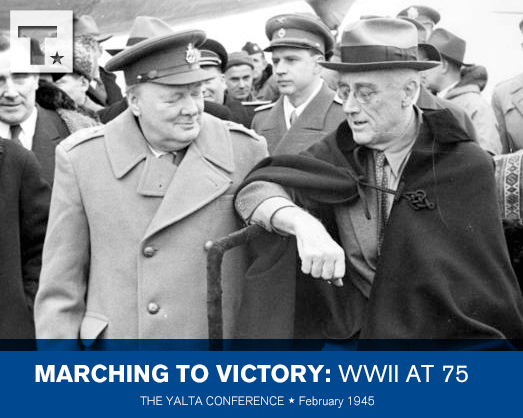
WWII 75: Marching to Victory | January 25, 2020
WWII highlights from the Truman Library’s archives and collections
Marching to Victory: The Battle of the Bulge
Thursday, January 25, 1945
How did the Allied forces win the bloodiest American battle of the deadliest war in human history?
On December 16, 1944, at the beginning of a historically frigid winter, the Germans launched what would be their final major offensive of World War II. Over the course of six weeks, Allied forces thwarted the German armies’ attempts to split them. The Battle of the Bulge was the bloodiest battle for American forces on the Western Front during WWII – 20,000 Americans were killed in this battle; tens of thousands more were wounded, missing, or captured. Despite these great losses, the Battle of the Bulge ended with an Allied victory 75 years ago today.
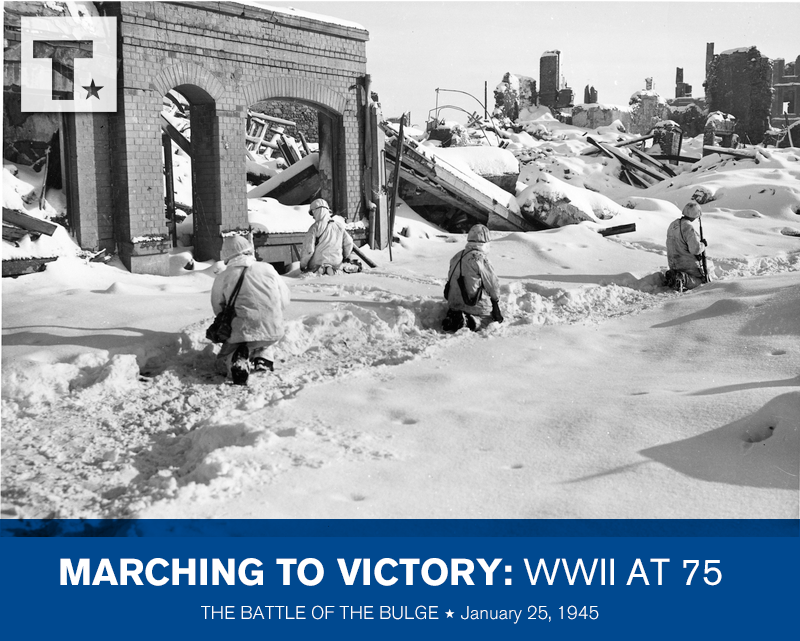
Truman Library Groundbreaking Ceremony | September 17, 2019
Gov. Parson, Archivist Ferriero and Clifton Truman Daniel Break Ground on Library
The Truman Library’s transformative renovation officially kicked off on September 5 with a groundbreaking ceremony featuring Missouri Governor Mike Parson, Archivist of the U.S. David Ferriero, Missouri State Senator John Rizzo, the president’s grandson Clifton Truman Daniel as well as many other local officials and friends of the Truman Library.
Highlights of the special remarks made from a few of our distinguished speakers include the following:
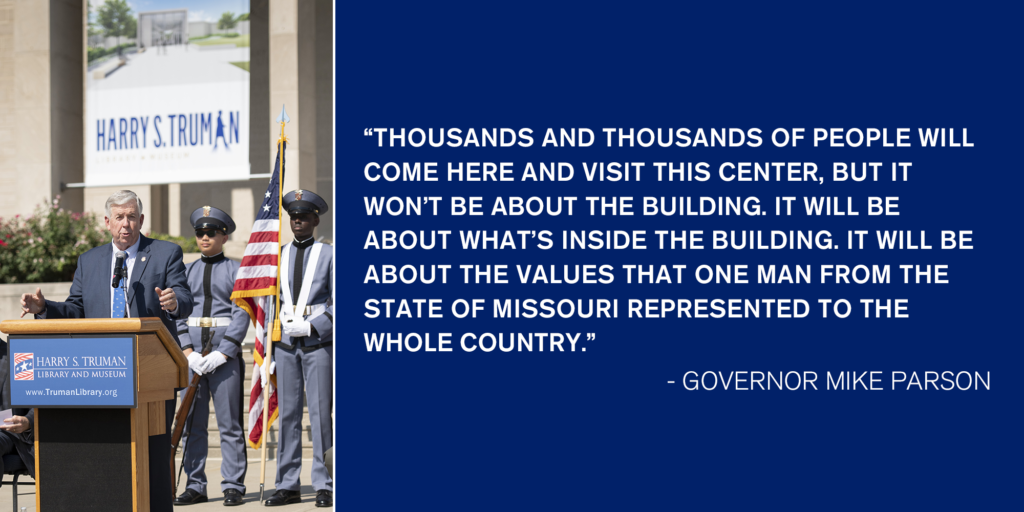
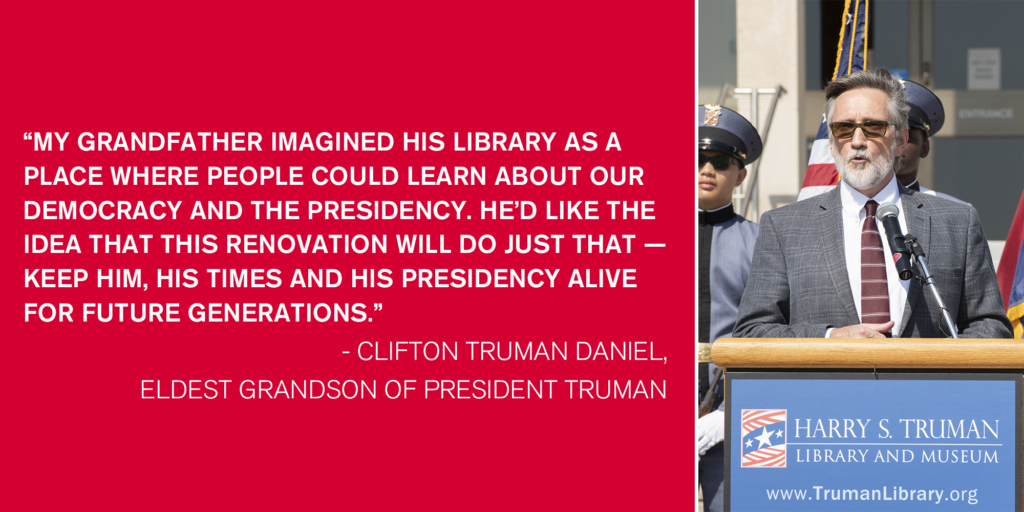
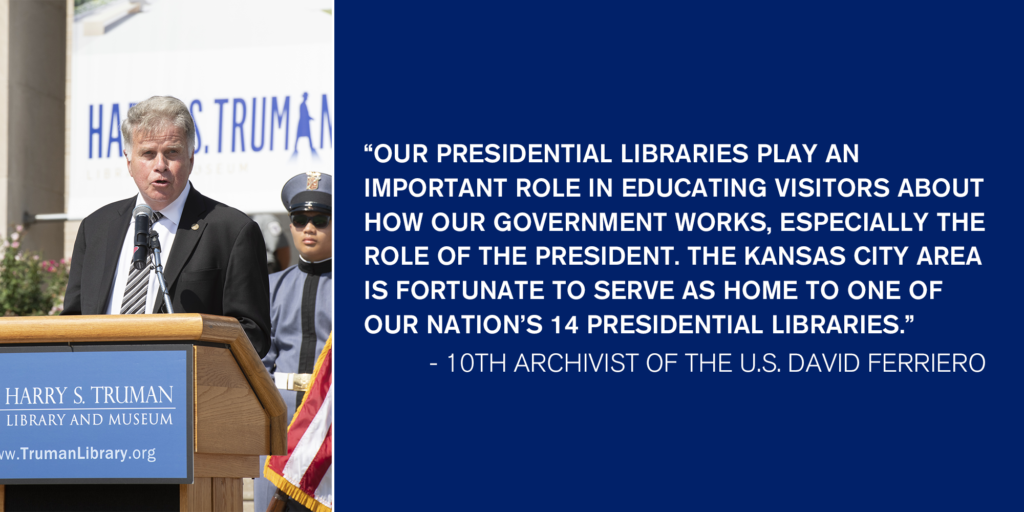
More than 125 friends, donors, board members and local dignitaries joined us for a very special day that will go into the books as one of the great days in the history of the Truman Library. The historic ceremony drew the attention of local media, with coverage from Fox 4, KMBC, KCTV 5, The Examiner and more.
The Truman Library is currently closed for a massive renovation. Learn more about the exciting future of the Truman Library here.
Join our email list to receive Truman updates right in your inbox:
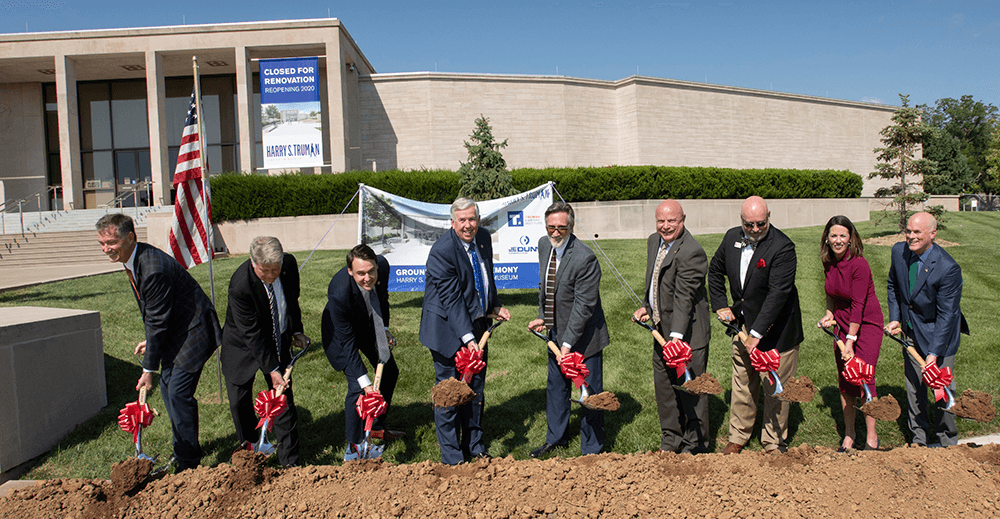
Experiencing Truman While the Truman Library is Under Renovation | August 8, 2019
The Harry S. Truman Presidential Library and Museum is currently closed for a transformative renovation. A new museum entrance and permanent exhibition are scheduled for completion this fall in celebration of the 75th anniversary of Truman’s ascension to the presidency. Tour the new museum virtually in this fly-through video:
We invite you to learn more about this historic campaign and how you can get involved here, and follow us on Facebook, Twitter and Instagram for the latest updates on the project.
Meanwhile, if you are planning a trip to the Kansas City area, we encourage you to visit the other Truman-related sites in Independence and the surrounding areas: Read More
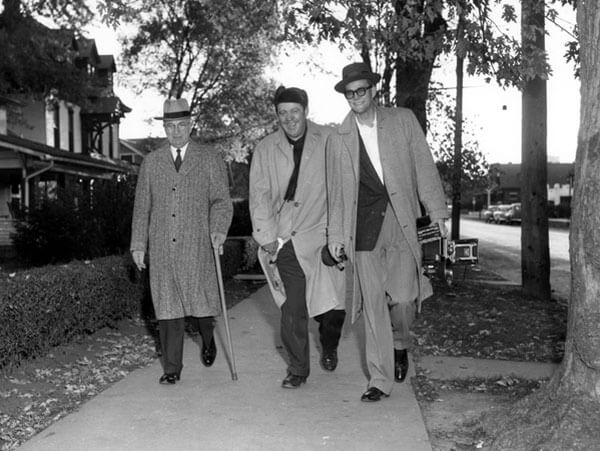
Event Preview | August 2, 2019
History Happy Hour: In the Kitchen with Bess
Friday, August 16, 2019 from 4:00-5:00 p.m.
Truman Library Institute
5151 Troost Ave., Ste. 300
Kansas City, MO 64110
On Friday, August 16, the Truman Library is hosting a History Happy Hour event featuring one of the Truman Library’s archivists, Tammy K. Williams. This event takes place at the Truman Library Institute in Kansas City and will feature Williams exploring Bess Truman’s recipe box, including recipes that she gave out and received, food trends in the 1940s and 1950s, and some of the Truman family favorite foods and meals.
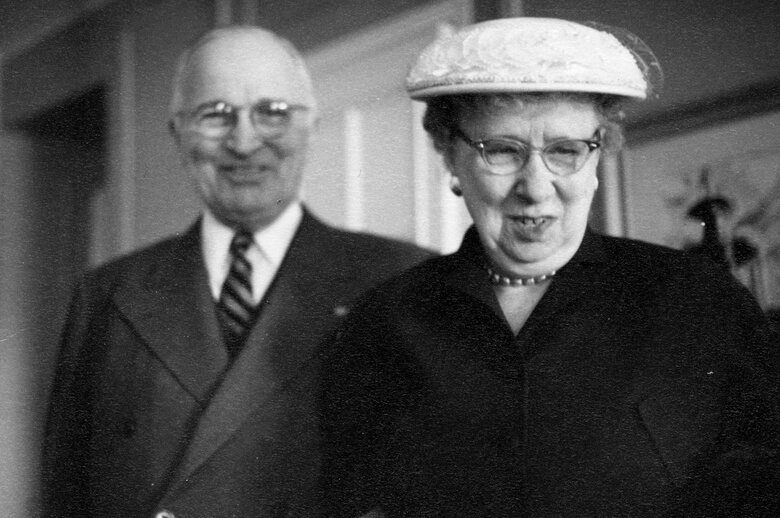
The Missouri Compromise | July 16, 2019
How Truman Became the Nominee for Vice President
Harry Truman did not want to be Vice President and he wasn’t shy about saying so to anyone who asked him, from his colleagues in the Senate to members of his family. “It is funny how some people would give a fortune to be as close as I am to it and I don’t want it,” he wrote to Margaret on July 9, 1944, just 12 days before he would ultimately accept the Democratic Party’s nomination.
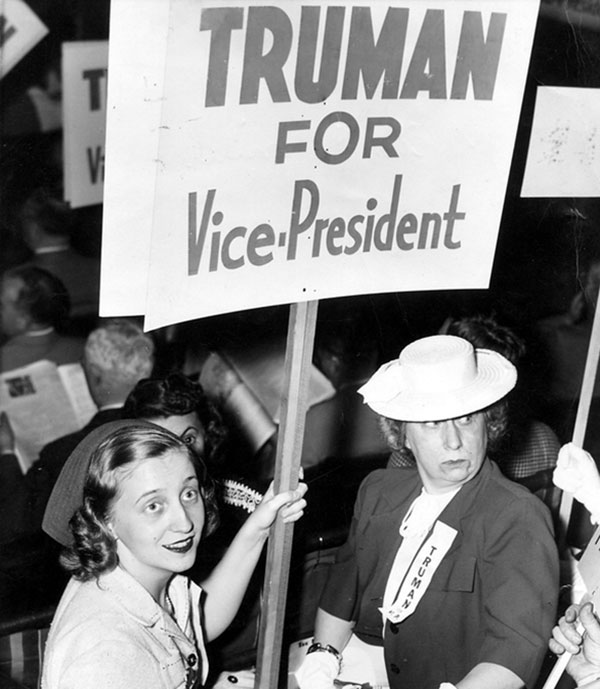
Museum Highlight | July 9, 2019
10 Things to See Before the Truman Library Closes for a Year
The Harry S. Truman Presidential Library and Museum recently announced a significant renovation that will close the Library for a year. Though the closing date, July 22, is approaching, there are still opportunities for guests to step into Harry and Bess Truman’s world before the doors close.
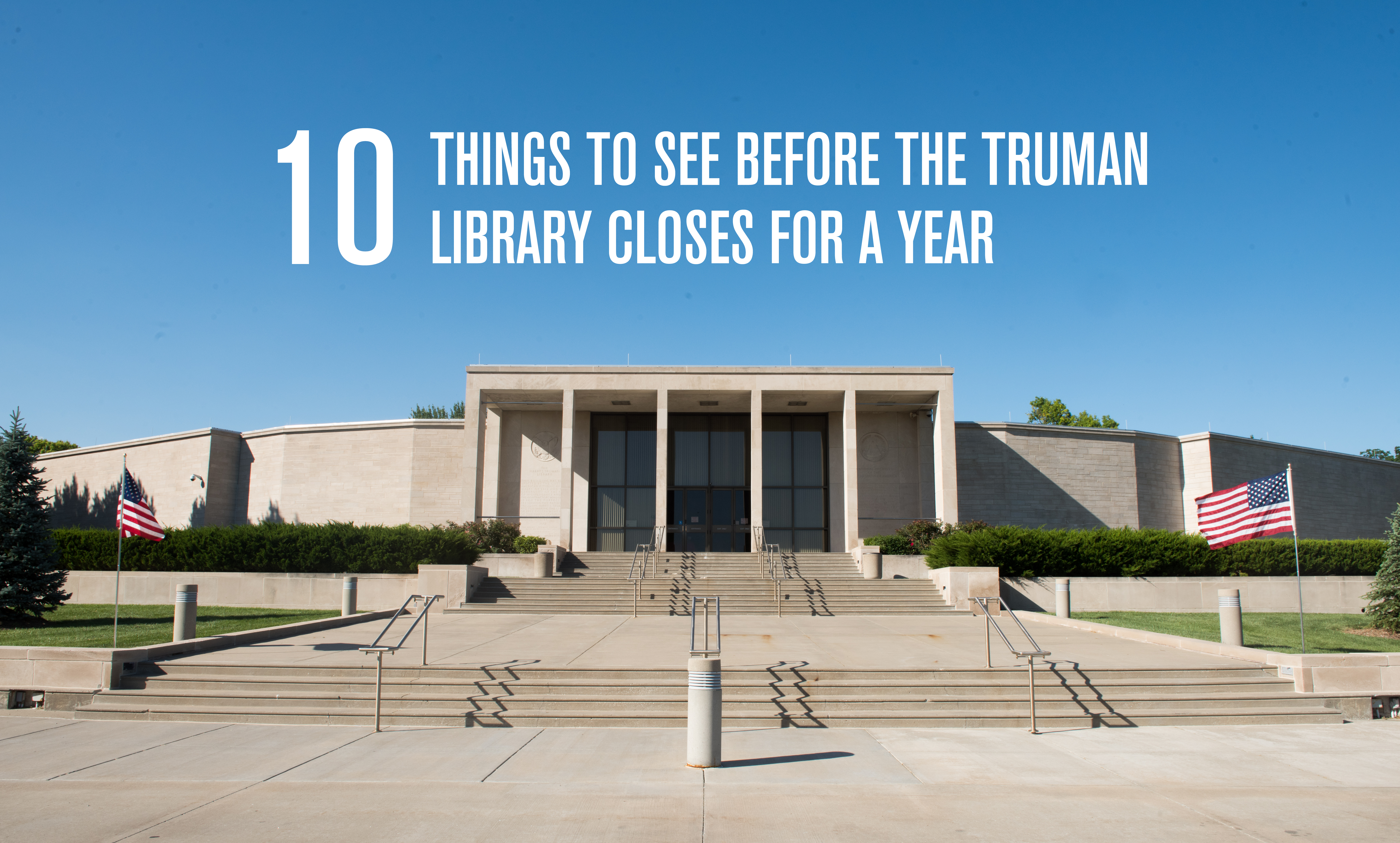
Event Preview | June 26, 2019
History Happy Hour: Women at War with Natalie Walker
Friday, July 12, 2019 from 4:00-5:00 p.m.
3 Trails Brewing
111 N. Main St.
Independence, MO 64050
On Friday, July 12, the Truman Library is hosting a History Happy Hour event featuring Truman Library Institute Museum / Archives Technician Natalie Walker. This event takes place at 3 Trails Brewing in on the Independence Square and will feature Walker examining what followed President Truman’s landmark decision to sign the Women’s Armed Services Integration Act (June 12, 1948). Walker will discuss the impact of the Women’s Armed Services Integration Act through the fascinating story of Ernie Wagner, who served in the Air Force in the Korean War. Enjoy a behind-the-scenes look of the Truman Library’s extensive collection as Walker uses artifacts and photos from Wagner to tell her story.
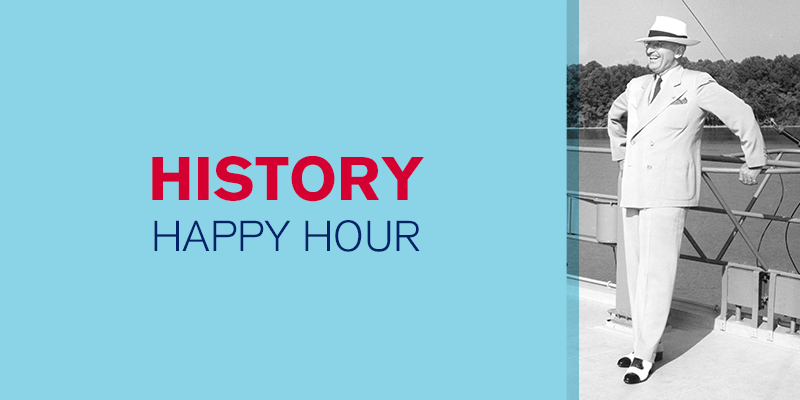
Event Preview | May 17, 2019
History Happy Hour: World War I and its Aftermath with Garrett Peck
Thursday, June 6, 2019
4:00-5:00 p.m.
Tom’s Town Distilling Company
On Thursday, June 6, the Truman Library is partnering with the National World War I Museum and Memorial for a History Happy Hour event featuring author and historian Garrett Peck. This special event takes place at Tom’s Town Distilling Company and will feature Peck discussing his latest book, The Great War in America: World War I and Its Aftermath, which examines the American experience during World War I and the unexpected changes that rocked the country in its immediate aftermath — the Red Scare, race riots, women’s suffrage and Prohibition, particularly timely on the centennial of the Armistice. Read More
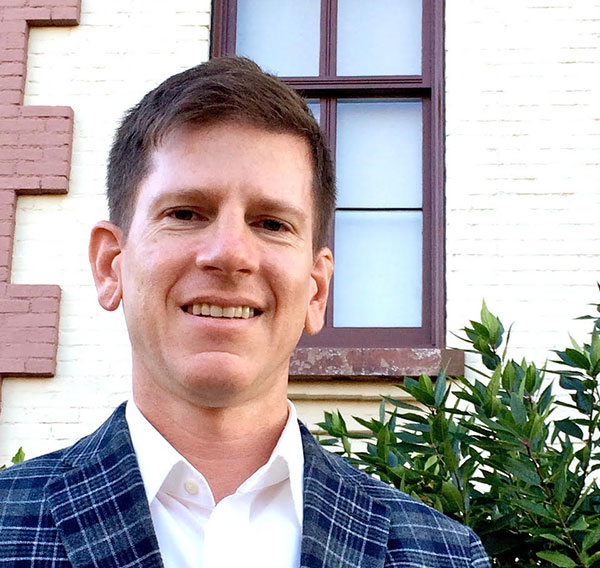
2019 Harry S. Truman Legacy of Leadership Award | May 2, 2019
Dr. Madeleine K. Albright, Former U.S. Secretary of State
The 2019 Harry S. Truman Legacy of Leadership Award was presented on Thursday, May 2, 2019 at Wild About Harry in Kansas City, Missouri
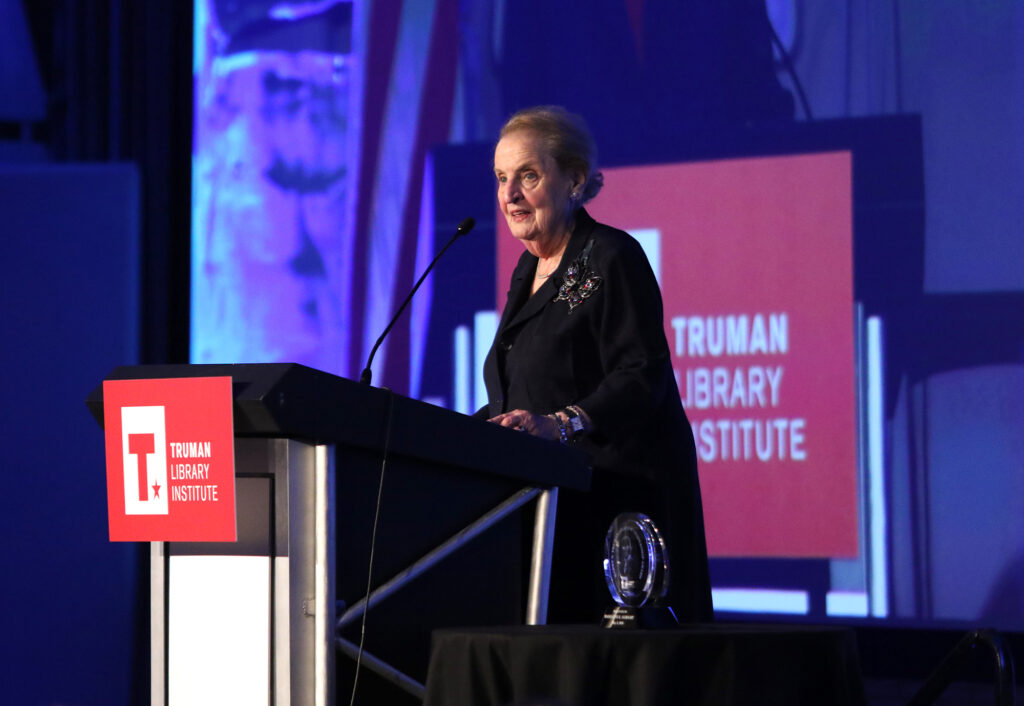
I AM DELIGHTED to be here tonight in the “Kansas City White House.” And I am deeply honored by this award. I chair several organizational boards, including the Harry S Truman Scholarship Foundation. So I often have the pleasure of presenting awards to others. And I will tell you frankly that, although it is certainly more blessed to give, it is definitely more fun to receive.
Tonight was billed to me as an evening of entertainment, substance and purpose. I am in favor of all three. And the chairs of tonight’s gala, Madeleine McDonough and Cyd [Sid] Slayton, should be congratulated for putting all the ingredients together in such a fabulous way.
I also want to express my appreciation to our honorary chairs, Susan and Tuck Spaulding. I applaud them and everyone in the audience for coming out to support a great cause.
Finally, allow me to recognize some very special friends in this audience.
The Archivist of the United States, David Ferriero, administers the presidential library system and plays a key role in preserving and sharing America’s historical records.
Harry Truman once said, “there is nothing new in the world except the history you do not know.” Thanks to David and the entire library team, future generations will know a whole lot more about our greatest American leaders.
I am also thrilled to be here tonight in the company of a group of dear friends from around the world.
These former Foreign Minister colleagues have come a great distance in order to participate in a special conference we are convening this weekend at the Truman Library, in partnership with the Aspen Institute.
I would to like to ask all of these distinguished diplomats to stand up and be recognized.
By the way, our group’s official name is the Aspen Ministers Forum. Its unofficial name is “Madeleine and her exes.”
I wanted to bring my friends and former counterparts to the Truman Library because of the special meaning that place holds for me, something which also makes this evening and this award truly meaningful.
Harry Truman was my first American President.
As many of you know, I was not born in the United States. When I was a little girl, my family was twice forced to flee our home in Czechoslovakia, the first time by Hitler, the second by Stalin. On November 2, 1948, I was in London, and I remember sitting in a bathtub listening to the returns from the American elections. I was already hooked on foreign policy because my father was a diplomat, but that election hooked me on politics – and on Harry Truman.
Just eight days later, my family arrived in America, sailing as millions before us had past the Statue of Liberty, where we were welcomed by the most generous people on earth.
My father used to tell a story about the reception Americans give to those who arrive here after being driven from their homes. He said that people in other countries would say to refugees: “We are sorry that terrible things have happened in your country. You are welcome here. We hope you have everything you need. And, by the way, when do you think you will be returning home?” Americans say, “We are sorry that terrible things have happened in your country. You are welcome here. We hope you have everything you need. And, by the way, when do you think you will become a citizen?”
My father loved liberty and was astonished by the degree of freedom he found here in America.
When Clifton’s mother, Margaret Truman, made her famous piano debut, my father was amazed that a critic would dare to say she was anything short of terrific. And he was amazed that when Margaret’s father vowed to punch the critic in the nose, and perhaps kick him somewhere else, people made fun – of the president. I do not have to tell this audience that Harry Truman was both a remarkable president and a remarkable man.
I also do not have to tell you that he came from a remarkable place. I love Missouri – not only because of its Truman connections, but also because it is the state where I had my first job. I was newly-married and just out of college. My husband was in the army and we lived in Rolla, where I was a reporter for the Rolla Daily News. I did stories on the glamour of local society, along with more than my share of obituaries. I also sold classified ads. My favorite read, “Cemetery plot, owner must move, will sell at sacrifice.”
Now all this was some time ago. In fact, I tell my students now that I went to college about half way between the invention of the iPhone and the discovery of fire. So it was much later when I became Secretary of State and the question arose as to where to hold a particular ceremony.
The event was to mark NATO’s decision to admit Hungary, Poland and my native Czech Republic as new members. As Secretary of State, I did not get to decide everything. But I was able to decide this. And I could not think of a more appropriate place than this state and the library devoted to the man whose vision was responsible for NATO. As I stood there with the three foreign ministers, I was so excited that I could not help but use an old Czechoslovak expression – Hallelujah.
The ceremony was especially meaningful because we brought out a famous table from the presidential suite of the Muelbach Hotel, the table which Harry Truman had used to sign legislation authorizing aid to Greece and Turkey, thereby bringing the Truman Doctrine to life. That table was also used in 1965 when President Lyndon Johnson came to the Library to sign the Medicare legislation into law and to present Medicare cards number one and number two to Harry and Bess, in recognition of his fair deal proposals for universal health care.
I am told that everyone at the Truman Library still refers to that piece of furniture as “The Truman-Johnson-Albright Major National and International Policies Table.” A year after the NATO ceremony, I was thrilled to join Representatives Ike Skelton and Roy Blunt in renaming the headquarters of the Department of State in Truman’s honor.
As part of the dedication festivities, we gave a special dinner at the State Department. And someone thought it would be fun to recreate a menu from a White House dinner hosted in honor of a visiting Prime Minister – in 1949. Those who were aware of the meal’s historical roots were delighted to eat foods from President Truman’s day. Those who were not were rather confused to be served “Gingerale and Peach salad with toasted Triscuits” at the State Department.
The Harry S Truman State Department building still has a great ring to it. And that’s because no leader did more than Harry Truman in his time to shape America’s fundamental global role in our time. The decisions he made, the institutions he built, the principles he stood for, have kept us safe through more than seven decades of turbulence and testing. And god willing, they will light our way for decades to come.
It is worth looking back on that time and remembering that, in 1947, the American people were weary of war and wary of new commitments. But in Europe, life-giving links between farm and market, enterprise and capital, hope and future had been severed in the aftermath of the global conflict.
President Truman and his advisers knew that the economic and political health of our allies in Europe and the security and prosperity of America were closely connected. Faced with high uncertainty and risk, they acted with vision and boldness. The result was a massive package of U.S. assistance that would ultimately total more than $130 billion in today’s dollars.
British Foreign Minister Ernest Bevins called the Marshall Plan “a lifeline to sinking men,” and it was – although I expect that some women in Europe were grateful also. It was also a shining hour for the United States Senate, which approved the Plan on a bipartisan basis – and in the midst of a heated Presidential campaign. History records that Harry Truman became President after only 82 days as Vice President. He was thought to know little of foreign policy, and in fact, was much in the dark about important questions of national security.
Many saw him at the time as too ordinary a man to inherit Franklin Roosevelt’s daunting job. But in fact, Truman’s bedrock character, life experience and political background prepared him well for the momentous decisions he would soon be called upon to make. When Roosevelt died, Truman was ready – whether he, himself, knew it or not.
In the weeks and years that followed, he amassed an astonishing record:
- bringing the war in Europe and the Pacific to an end, and then jump-starting recovery in both places;
- helping to found the United Nations;
- forging NATO and the OAS;
- deciding, against the recommendation of his top advisers, to recognize the newborn State of Israel;
- establishing the Point Four program;
- airlifting supplies to a blockaded Berlin;
- defending South Korea from Communist aggression;
- standing up to General McArthur in order to preserve civilian control of the military;
- and spending the political capital required to desegregate our armed forces, despite the resistance of military leaders.
That is a towering legacy of sound judgment and political courage. And it is why Harry S Truman – assisted by such giants as Secretaries of State George Marshall and Dean Acheson – came to be regarded as the greatest foreign policy leader of the greatest generation. And it explains why Winston Churchill was moved to tell President Truman that “[he], more than any other man, [had] saved Western Civilization.”
Harry Truman could never have earned such praise had he not understood and reflected what is best about America.
President Truman was relentlessly upbeat about the prospects for human progress, but he warned repeatedly of the dangers posed by human weakness and fear. He was a leading champion of the United Nations Charter, but never assumed that promises alone could keep the world safe. He was proud of America’s strength, but knew that our country could not prosper without vigorous allies and good friends. And he thought the United States was exceptional not because it was exempt from international law, but because it was determined to create a world in which the same rules would apply to everyone.
Looking back, we admire President Truman because he dared to build greatly amid high winds and heavy storms, and because what he built was made to last. Looking ahead, we realize that we need that kind of leadership again.
When America has gone off track, it has often been because we ignored the balance that President Truman brought to international policy – a balance between lofty ideals and practical means. Truman was enough of a skeptic to understand that there are limits to what any nation or, for that matter, any generation can achieve.
But he was also convinced that power should be used – and that if we failed to act on our values, others would act on theirs, leaving our children and grandchildren to deal with the consequences.
Obviously, I cannot predict with certainty what actions President Truman would support if he were alive today. But I suspect he would warn us against complacency and advise us to make full use of every available foreign policy tool. He would urge us to stop the partisan warfare and ask us to embrace the principle that politics should stop at the water’s edge. But perhaps above all, he would expect America to do everything in its power to fight for democracy and against a rising authoritarian and nationalist tide.
More than seventy years ago, American stood alone in a damaged world, facing a rising Soviet empire and a devastated Europe.
“Events have brought our American democracy to new influence and new responsibilities,” Truman said. “This will test our courage, our devotion to duty and our concept of liberty.”
“Tyranny,” he continued in words that could have been uttered today, “is not new in the world. As long as democracy has existed, so has tyranny. But never has it been harder for tyranny and democracy to coexist. The reason is the elimination of distance. Where once we could ignore a far off tyranny, there are no longer any far-off places. Today, everybody on the globe is our neighbor.”
President Truman and the leaders of his time responded to this new reality by inventing institutions that would increase cooperation among nations. Over the years, the combined strength of those organizations made the world more prosperous, brought down the Berlin Wall and helped make the democratic tide a rising tide on every continent.
Today, in a world that is even more interconnected and interdependent, America faces a similar choice. We have an opportunity to make our nation more secure within a world that is healthier, richer and more peaceful than it has ever been.
But if we are not prudent in exercising that power, or if we ignore the challenges posed by those who seek to undermine democracy and the rule of law, it will make it much harder in the long run to achieve our goals. By gathering at the Truman Library this weekend, soon after the seventieth anniversary of the NATO alliance, my former foreign ministers and I will reaffirm our conviction that the alliance and institutions created by Harry Truman’s generation are platforms for progress, not relics to be bypassed for fear they will hold us back or tie us down.
It is true that institutions at age 70, like people, need a little refurbishing. But it would be a mistake for America to simply walk away from all that Truman and his generation built. Because we have learned over and over again through history that the democratic values we cherish are not self-perpetuating and that problems abroad, if left unattended, come home to America.
Our ideals have enemies, and those enemies can amass great power and inflict enormous harm, especially when democratic forces are divided and bickering. Even the closest of friends will not agree on every specific issue or policy. No nation sees the world precisely the same as any other. What is vital is that free nations continue to agree on the big things, so that past mistakes become future lessons, and the demons of terror and totalitarianism, genocide and ethnic cleansing are recognized early and stoutly opposed.
It is easy to look at today’s headlines and conclude that the world is a hopeless mess, but I do not believe that and neither should any of you. It helps, after all, to put matters into perspective.
During Harry Truman’s time, there was a daunting array of dangers, including the Communist expansion in Central Europe; the Maoist revolution in China; the turbulent partition of India; a desperate clash between Arabs and Jews in the Holy Land; and tensions on the Korean Peninsula that would soon lead to war.
At home, there was talk about the need for bipartisanship, but there were also currents of recrimination and scapegoating that would produce the McCarthy era – a period of deep division both within Congress and between Congress and the Executive Branch.
In addition, the nuclear era had just begun, bringing with it a feeling that Armageddon might be just around the corner. I mention this not to depress you further, but to remind us all that democratic institutions are resilient and that problems that appear insoluble often become less so over a period of time.
All that is required is leadership of the type that Harry Truman was able to provide – strong, determined, and with faith in the values of America at its best. What is required, as well, is a willingness on the part of the American people to be more than consumers of liberty, but also contributors and sustainers of it.
Democracy depends on the quality of its citizens, and although much has changed since Harry Truman was in the White House, the success of American democracy remains not only the linchpin of our own future, but a source of inspiration for the world.
Thank you, once again, for honoring me with this award, and for honoring one of our greatest presidents through your support of this great American institution.


